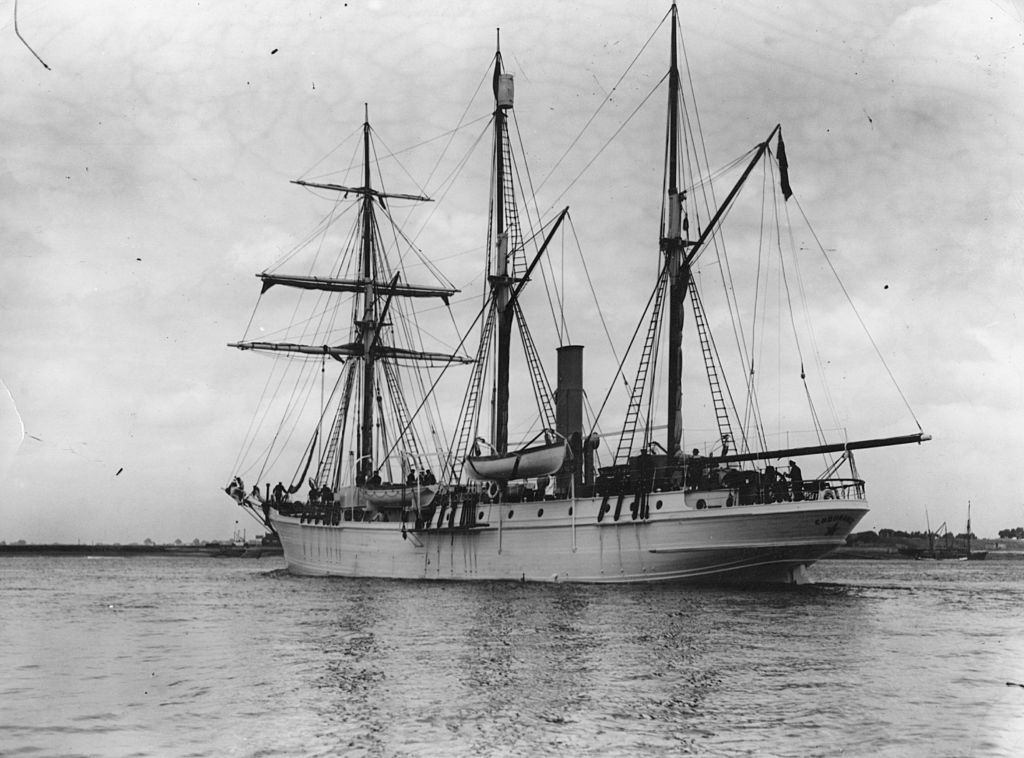Marine archaeologists find Shackleton's ship Endurance off Antarctica, 107 years after it sank

A free daily email with the biggest news stories of the day – and the best features from TheWeek.com
You are now subscribed
Your newsletter sign-up was successful
A Falklands Maritime Heritage Trust expedition on Saturday discovered the wreckage of Anglo-Irish explorer Sir. Ernest Shackleton's ship Endurance 10,000 feet below the surface of Antarctica's Weddell Sea, 107 years after it sank during Shackleton's famous, ill-fated Imperial Trans-Antarctic Expedition, BBC News reported early Wednesday. The ship sank in 1915 after getting stuck, then crushed, in sea ice, starting a long and heroic survival quest.
"Without any exaggeration this is the finest wooden shipwreck I have ever seen — by far," marine archaeologist Mensun Bound, part of the FMHT expedition, told BBC News. "It is upright, well proud of the seabed, intact, and in a brilliant state of preservation." The expedition used a South African icebreaker, Agulhas II, and it took two weeks for its remote-operated submersibles to find the sunken ship.
"The wreck itself is a designated monument under the international Antarctic Treaty and must not be disturbed in any way," BBC News reports. "No physical artifacts have therefore been brought to the surface."
The Week
Escape your echo chamber. Get the facts behind the news, plus analysis from multiple perspectives.

Sign up for The Week's Free Newsletters
From our morning news briefing to a weekly Good News Newsletter, get the best of The Week delivered directly to your inbox.
From our morning news briefing to a weekly Good News Newsletter, get the best of The Week delivered directly to your inbox.

Shackleton set out in 1914 to lead the first land expedition across Antarctica, from shore to shore over the South Pole. After the Endurance sank, he led his crew in small lifeboats on a perilous sea journey to the inhospitable Elephant Island, then took a smaller crew for the long sea voyage to South Georgia Island, where, after surviving treacherous seas and hurricane-force winds, he and two men trekked 32 miles across the mountainous island to get help. All his Endurance crew survived.
Finding the Endurance was especially challenging because "the Weddell Sea is pretty much permanently covered in thick sea ice, the same sea ice that ruptured the hull of Endurance," BBC News explains. Luckily for the expedition, if not the planet, "this past month has seen the lowest extent of Antarctic sea-ice ever recorded during the satellite era, which stretches back to the 1970s."
A free daily email with the biggest news stories of the day – and the best features from TheWeek.com
Peter has worked as a news and culture writer and editor at The Week since the site's launch in 2008. He covers politics, world affairs, religion and cultural currents. His journalism career began as a copy editor at a financial newswire and has included editorial positions at The New York Times Magazine, Facts on File, and Oregon State University.
-
 Sepsis ‘breakthrough’: the world’s first targeted treatment?
Sepsis ‘breakthrough’: the world’s first targeted treatment?The Explainer New drug could reverse effects of sepsis, rather than trying to treat infection with antibiotics
-
 James Van Der Beek obituary: fresh-faced Dawson’s Creek star
James Van Der Beek obituary: fresh-faced Dawson’s Creek starIn The Spotlight Van Der Beek fronted one of the most successful teen dramas of the 90s – but his Dawson fame proved a double-edged sword
-
 Is Andrew’s arrest the end for the monarchy?
Is Andrew’s arrest the end for the monarchy?Today's Big Question The King has distanced the Royal Family from his disgraced brother but a ‘fit of revolutionary disgust’ could still wipe them out
-
 Blue Origin launches Mars probes in NASA debut
Blue Origin launches Mars probes in NASA debutSpeed Read The New Glenn rocket is carrying small twin spacecraft toward Mars as part of NASA’s Escapade mission
-
 Dinosaurs were thriving before asteroid, study finds
Dinosaurs were thriving before asteroid, study findsSpeed Read The dinosaurs would not have gone extinct if not for the asteroid
-
 SpaceX breaks Starship losing streak in 10th test
SpaceX breaks Starship losing streak in 10th testspeed read The Starship rocket's test flight was largely successful, deploying eight dummy satellites during its hour in space
-
 Rabbits with 'horns' sighted across Colorado
Rabbits with 'horns' sighted across Coloradospeed read These creatures are infected with the 'mostly harmless' Shope papilloma virus
-
 Lithium shows promise in Alzheimer's study
Lithium shows promise in Alzheimer's studySpeed Read Potential new treatments could use small amounts of the common metal
-
 Scientists discover cause of massive sea star die-off
Scientists discover cause of massive sea star die-offSpeed Read A bacteria related to cholera has been found responsible for the deaths of more than 5 billion sea stars
-
 'Thriving' ecosystem found 30,000 feet undersea
'Thriving' ecosystem found 30,000 feet underseaSpeed Read Researchers discovered communities of creatures living in frigid, pitch-black waters under high pressure
-
 New York plans first nuclear plant in 36 years
New York plans first nuclear plant in 36 yearsSpeed Read The plant, to be constructed somewhere in upstate New York, will produce enough energy to power a million homes
